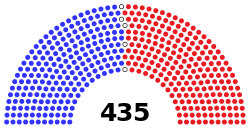
Back Amerikaanse Huis van Verteenwoordigers AF Repräsentantenhaus der Vereinigten Staaten ALS Speliendena Hūs þāra Geānedan Rīca American ANG مجلس النواب الأمريكي Arabic مجلس نواب امريكا ARZ Cámara de Representantes de los Estaos Xuníos AST ABŞ Nümayəndələr Palatası AZ United States House of Representatives BAR Палата Прадстаўнікоў ЗША BE Палата прадстаўнікоў ЗША BE-X-OLD
This article does not have any sources. (February 2013) |
United States House of Representatives | |
|---|---|
| 118th United States Congress | |
 Seal of the House | |
 Flag of the United States House of Representatives | |
| Type | |
| Type | |
Term limits | None |
| History | |
New session started | January 3, 2023 |
| Leadership | |
| Structure | |
| Seats | 435 voting members 5 non-voting members 217 for a majority |
 | |
Political groups | Majority (217)
Minority (213)
|
Length of term | 2 years |
| Elections | |
| Plurality voting in 46 states[a] Varies in 4 states | |
Last election | November 8, 2022 |
Next election | November 5, 2024 |
| Redistricting | State legislatures or redistricting commissions, varies by state |
| Meeting place | |
 | |
| House of Representatives Chamber United States Capitol Washington, D.C. United States of America | |
| Website | |
| www | |
| Rules | |
| Rules of the House of Representatives | |
The United States House of Representatives is a part of the United States (U.S.) Congress. Congress is the legislature of the U. S. government and makes federal laws. The other part of Congress is the U. S. Senate. There are maximum 435 members in the United States House of Representatives. These members are called U. S. Representatives or just representatives. All representatives are elected every two years.
The number of representatives from each state depends on the number of people in that state, the population, but there is at least one U. S. representative from each of the 50 states. Every 10 years, the United States Census Bureau counts the population of the United States. States gain or lose Representatives based on the count. The House of Representatives is in one of the two wings in the U.S. Capitol building. The other wing is for the Senate. Sometimes the House of Representatives is informally called the House. The chairman/chairperson in the U.S. House of Representatives is called the Speaker of the House.
According to the U.S. Constitution, all bills about raising revenue, which includes taxes, must start in the House of Representatives. Also, only the House of Representatives has the power to impeach certain officials, such as the president or federal judges. According to the U.S. Constitution, the House of Representatives can expel, or impeach, one of its representatives by a vote of at least two-thirds of its members.
Cite error: There are <ref group=lower-alpha> tags or {{efn}} templates on this page, but the references will not show without a {{reflist|group=lower-alpha}} template or {{notelist}} template (see the help page).